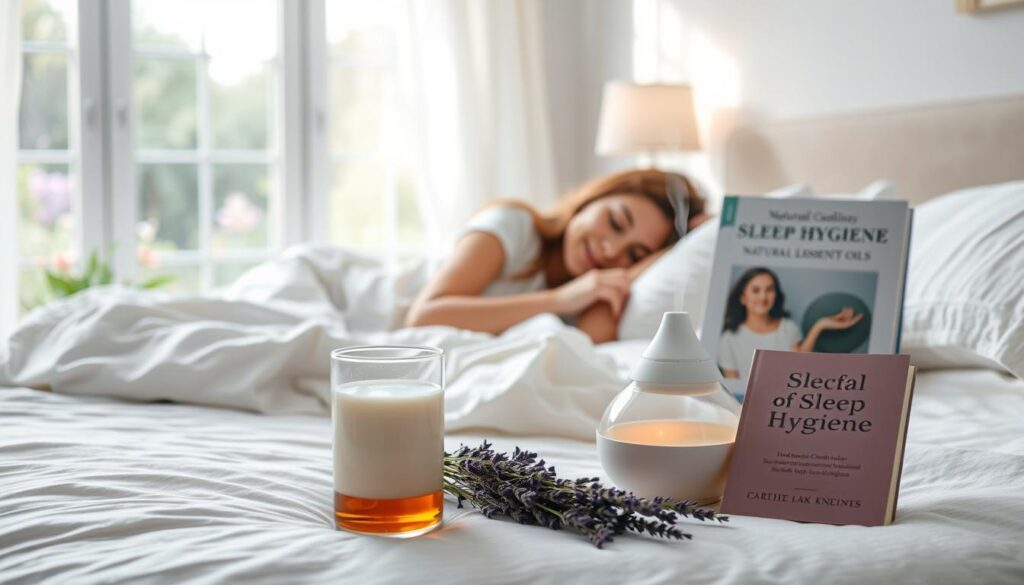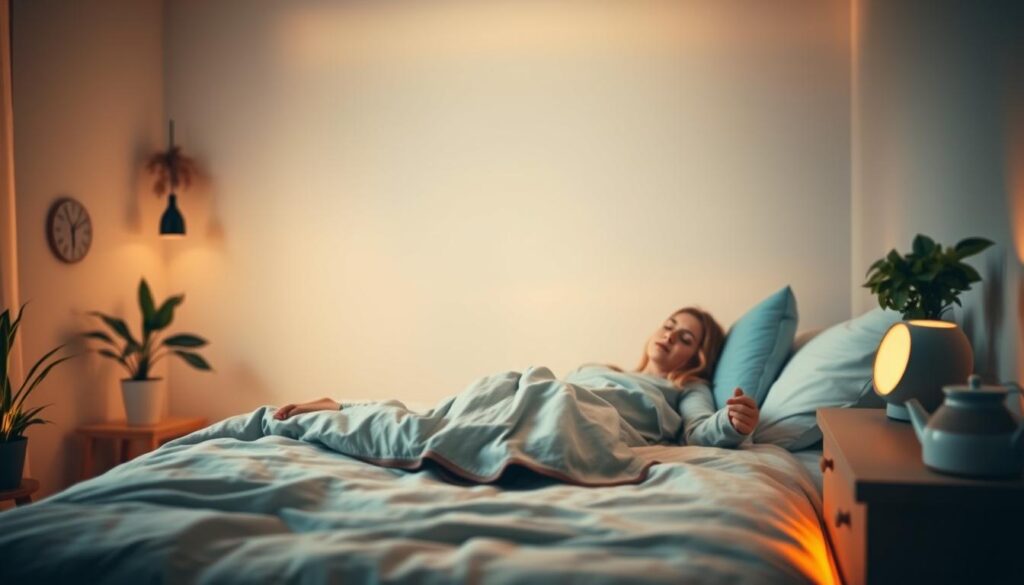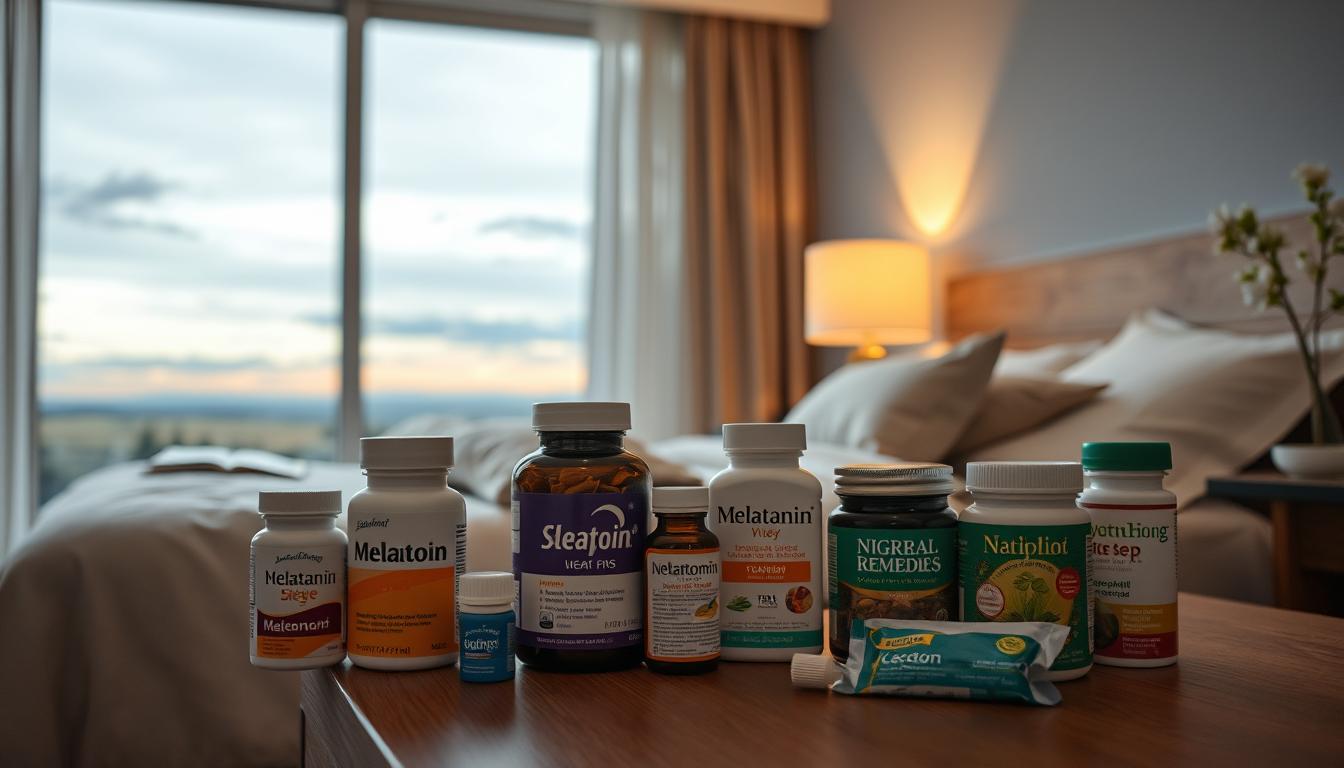Teens today face unique sleep challenges, from school pressures to late-night screen time. Finding the best sleep aids for teenagers can feel overwhelming. This article explores proven OTC options and practical tips to help young adults rest better. Let’s dive into what works and what’s safe.
Key Takeaways
- Teens often struggle with sleep due to biological changes and tech use.
- OTC options like melatonin and herbal supplements are reviewed for safety and effectiveness.
- Key ingredients such as valerian root and chamomile are highlighted for their calming effects.
- Consulting healthcare providers before use ensures safe choices for adolescents.
- Combining sleep aids with healthy habits maximizes rest for teenagers.
Understanding Teen Sleep Challenges
Teens face unique sleep struggles shaped by their growing bodies and modern lifestyles. These challenges often require targeted solutions like sleep aids for teens to manage disrupted patterns. Let’s explore why rest becomes harder during adolescence.
Biological Changes in Adolescence
Teen bodies undergo shifts that push sleep cycles later. Here’s what happens:
- Melatonin release delays, making falling asleep before 11 PM tough.
- School start times clash with natural wake-up rhythms.
- Chronic sleep loss affects mood, focus, and health.
Impact of Technology on Sleep
Social media and screens play a big role. Blue light from devices suppresses melatonin:
“95% of teens use devices before bed, worsening sleep quality.” – American Academy of Pediatrics
| Screen Time Before Bed | Average Sleep Hours |
|---|---|
| 0–30 minutes | 7.5 hours |
| 31–60 minutes | 6.2 hours |
| Over 1 hour | 5 hours or less |
Addressing these factors helps teens create healthier routines. Sleep aids for teens can support recovery when combined with lifestyle changes.
Common Causes of Insomnia in Teens
Teens face unique challenges that disrupt sleep. Stress from school, social pressures, and busy schedules often keep minds racing long after lights-out. Let’s break down the top reasons teens struggle to fall asleep:
- Academic Pressure: Deadlines, exams, and grade anxiety create a cycle of worry.
- Social Struggles: Friendships, bullying, or identity concerns linger in their thoughts.
- Irregular Schedules: Late-night screen use or weekend all-nighters throw off natural sleep rhythms.
- Health Issues: Hormonal changes, ADHD, or unaddressed mental health struggles also play a role.
“Teens aren’t just ‘tired teens’—their brains are wired differently. We need to address root causes, not just symptoms.” – Dr. Lisa Marchese, Adolescent Sleep Specialist
| Factor | Impact |
|---|---|
| Overstimulation | Phones, games, or social media keep brains active. |
| Environmental Noise | Shared bedrooms or household sounds disrupt sleep cycles. |
| Caffeine Overuse | Sodas or energy drinks delay the body’s readiness for rest. |
Understanding these triggers helps families tackle insomnia effectively. Small changes like setting tech curfews or creating calm bedtime routines can make a big difference.
Introduction to Over-the-Counter Sleep Aids
When exploring best over-the-counter sleep aids for teens, understanding their purpose and safety is key. These products often use natural ingredients to support better rest without prescription drugs. Always consult a doctor before starting any new supplement.
How They Work
Many aids target specific sleep-related needs:
| Key Ingredient | Function | Common Brands |
|---|---|---|
| Melatonin | Regulates sleep-wake cycles | Nature’s Bounty, Now Foods |
| Valerian Root | Calms the nervous system | Herbs of Gold, Gaia Herbs |
| Chamomile | Reduces stress-induced insomnia | Yogi Tea Co., Traditional Medicinals |
Usage Guidelines
- Start with the lowest dose listed on packaging
- Avoid caffeine 4-6 hours before bedtime
- Track results for 2 weeks before adjusting
- Stop use if dizziness or daytime fatigue occurs
Evaluating Safety and Efficacy for Adolescents
Choosing safe and effective sleep aids for teens requires careful consideration of scientific evidence and professional guidance. Recent studies highlight the unique needs of adolescents, whose developing bodies and sleep patterns differ from adults.
“Over-the-counter sleep aids should never be used without first consulting a healthcare provider,” advises the American Academy of Pediatrics, emphasizing the importance of personalized advice for teens.
Clinical Research Findings
- Studies show melatonin supplements are generally safe for short-term use in teens with sleep phase disorders.
- Antihistamine-based products may cause daytime drowsiness, affecting school performance.
- Research from the Journal of Adolescent Health notes lack of long-term data on many popular sleep aids.
Expert Advice
Doctors recommend prioritizing non-pharmacological solutions first:
- Establish consistent bedtime routines
- Limit screen time before bed
- Consult a pediatrician before trying supplements
Parents should avoid products containing caffeine or stimulants marketed as “natural.” Always check ingredient lists for valerian root, chamomile, or other botanicals studied in pediatric populations.
Best sleep aids for teenagers
Choosing the right sleep aid can help teens manage occasional sleep struggles. Many over-the-counter (OTC) options are designed to support natural sleep patterns without relying on prescriptions. Here’s a closer look at what’s available and what makes them work.
Over-the-Counter Options
- Melatonin supplements like Nature’s Bounty Melatonin or Now Foods Fast Dissolve Tablets, which align with the body’s natural sleep cycle.
- Herbal blends such as Yogi Bedtime Tea or Nature’s Way Valerian Root Capsules, which combine calming botanicals.
- Antihistamine-based aids like Benadryl, though used cautiously due to drowsiness side effects.
Key Ingredients
Active components in these products play a crucial role:
- Melatonin: A hormone that signals the brain to prepare for sleep.
- Valerian Root: An herb linked to relaxation and reduced anxiety.
- Chamomile: Found in teas, it eases stress and promotes calmness.
Always check product labels and consult a healthcare provider before starting any new supplement. Prioritize options backed by clinical research and safety data for adolescents.
Natural Sleep Remedies for Adolescents
Many teens prefer natural sleep remedies for adolescents to avoid medications. These methods focus on the body’s own rhythms and relaxation techniques. Combining simple habits with proven alternatives can improve sleep without side effects.
Herbal options like chamomile tea or valerian root supplements are popular choices. These herbs promote relaxation without disrupting sleep cycles. Always check with a doctor before starting any new supplement.
- Chamomile tea: Calms the nervous system.
- Lavender essential oils: Inhale or diffuse before bed.
- Melatonin-rich foods: Tart cherry juice or almonds.
“Mindfulness practices reduce stress hormones like cortisol, making it easier to fall asleep.”
Mindfulness techniques work by calming an overactive mind. Try these steps:
- Breathing exercises: Slow inhales and exhales for 5-10 minutes.
- Body scans: Mentally relax each body part from toes to head.
- Journaling: Write down worries to clear the mind before bed.
Pairing herbal remedies with daily mindfulness creates a routine that supports better sleep. Consistency is key for long-term results.
Sleep Supplements for Young Adults
As teens transition into young adulthood, sleep needs shift. Sleep supplements for young adults often focus on natural ingredients like melatonin or valerian root to support changing sleep patterns. These products differ from teen-focused options by addressing stress-related insomnia or circadian rhythm disruptions common in early adulthood.
- Now Foods Melatonin 3 mg
- Nature’s Way Valerian Root Extract
- Source Naturals 5-HTP
A 2023 study in the Journal of Adolescent Health found 68% of young adults using these supplements reported improved sleep onset. Always check labels for caffeine-free formulas and avoid blends with stimulants.
| Brand | Key Ingredients | Dosage |
|---|---|---|
| Now Foods | Melatonin, chamomile | 1-3 mg before bed |
| Nature’s Way | Valerian root extract | 150-300 mg nightly |
| Source Naturals | 5-HTP (50-100 mg) | 30 minutes pre-bed |
“Look for products with third-party lab testing to ensure purity,” advises Dr. Lisa Anne, sleep specialist at Stanford Sleep Medicine.
Consult a healthcare provider before use, especially if taking other medications. Sleep supplements for young adults work best with consistent bedtime routines and reduced screen time.
Effective Sleep Aids for Teenage Insomnia
Managing teenage insomnia often requires balancing immediate relief with sustainable habits. While effective sleep aids for teenage insomnia can address urgent needs, long-term strategies build healthier sleep patterns.
Short-Term Relief
- Melatonin supplements (under 10mg doses) to reset sleep cycles
- Herbal teas like chamomile to calm nerves
- Over-the-counter antihistamines, but only with medical guidance
Long-Term Solutions
“Consistency beats quick fixes. Teens need stable routines to improve sleep quality over time.” – Dr. Sarah Collins, Adolescent Sleep Specialist
- Set fixed bedtime/wake-up times, even on weekends
- Reduce screen time 1 hour before bed to lower blue light exposure
- Practice 20-minute relaxation exercises nightly
Combining these approaches helps teens avoid over-reliance on sleep aids while addressing root causes. Always consult a healthcare provider before starting new treatments.
Top-Rated Insomnia Remedies for Teenagers
Finding the right top-rated insomnia remedies for teenagers can make a big difference in restoring healthy sleep patterns. Many options are designed with youth needs in mind, balancing safety and effectiveness.

- Melatonin Supplements: Brands like Nature’s Bounty and Now Foods offer low-dose formulas. These help reset sleep cycles without harsh chemicals.
- Valerian Root Extract: Products such as Gaia Herbs provide herbal support. Studies show it can improve sleep quality in adolescents.
- White Noise Machines: Brands like Marpac and LectroFan block disruptive sounds, creating calming environments.
- Sleep Apps: Apps like Calm and Sleep Cycle track patterns and guide relaxation routines tailored to teens.
Parents should consult doctors before trying new products. Pairing remedies with consistent bedtime routines often works best. Always check age guidelines and avoid untested supplements. Prioritizing sleep hygiene alongside these top-rated insomnia remedies for teenagers helps build long-term habits.
Safe Sleep Aids for Adolescents
Choosing safe sleep aids for adolescents requires careful consideration. Teens need products that address sleep struggles without risking health. Always prioritize options backed by scientific evidence and medical guidance.
Selecting Safe Options
Look for these features when selecting sleep aids:
- US FDA-approved supplements or OTC drugs
- Ingredients like melatonin (1-3 mg doses) or valerian root extracts
- Transparent labeling with no hidden chemicals
Recognizing Red Flags
Beware of these warning signs:
- Products claiming “instant cures” or “no side effects”
- Ingredients like alcohol or high caffeine levels
- Ads targeting teens without pediatrician approval
| Safe Ingredients | Risky Additives |
|---|---|
| Magnesium | Prescription-strength sedatives |
| Chamomile | Unregulated herbal blends |
| Lavender oil | Sugar-laden sleep gummies |
Always consult a healthcare provider before starting any new regimen. Prioritize sleep hygiene practices like consistent schedules and screen-free bedtime routines alongside any sleep aids.
Exploring Over-the-Counter Options
Choosing the right over-the-counter sleep aid involves comparing products and considering real experiences. Here’s how to evaluate options safely and effectively.
Brand Comparison
Popular options vary in ingredients and effects:
- Melatonin Supplements: Brands like Nature’s Bounty or Now Foods offer natural sleep support. Look for 0.5–1 mg doses for teens.
- Unisom (Doxylamine): Used for short-term sleep issues but requires caution due to side effects like drowsiness the next day.
- Valerian Root Extract: Herbal supplements like Irwin Naturals provide non-habit-forming alternatives.
User Reviews
“My daughter tried Now Foods Melatonin and fell asleep faster, but it didn’t work for my son.”
Common feedback highlights mixed results. Key takeaways from reviews:
- Consistency matters: Some teens see results quickly; others need time to adjust.
- Side effects: Drowsiness or headaches are occasionally reported.
- Consult a doctor before use: Many users mention checking with a healthcare provider first.
Always pair supplements with healthy sleep habits like limiting screen time and keeping a regular schedule.
Proven Ways to Improve Teenage Sleep Quality
Teens can boost sleep quality by adopting simple, research-backed habits. These strategies focus on routines and behaviors that support better rest without relying on medications.

Sleep Hygiene Strategies
- Set a consistent bedtime and wake-up time, even on weekends.
- Keep bedrooms dark and cool, using blackout curtains to block light.
- Avoid screens 1–2 hours before bed to reduce blue light exposure.
Behavioral Changes
Small shifts in daily habits make a big difference. Encourage:
- Daytime exercise—but finish workouts at least 3 hours before bedtime.
- Limiting caffeine after noon to avoid sleep disruption.
- Wind-down routines, like reading or taking a warm bath, to signal the body it’s time to rest.
Parents can help by modeling healthy sleep behaviors and creating a calm household environment. Small steps today build lasting habits for better rest.
Tips for Parents to Support Teen Sleep
Parents play a key role in helping teens develop healthy sleep patterns. Small changes can make a big difference. Here’s how to start:
- Set a consistent bedtime and wake time, even on weekends. Consistency helps regulate their internal clock.
- Encourage a tech-free hour before bed. Replace screens with reading or calming activities.
- Create a sleep-friendly bedroom: cool, dark, and quiet. A comfortable mattress and pillows matter too.
- Model good habits. Teens often mimic parental behavior, so stick to your own sleep schedule.
- Talk openly about stress. Listen to their concerns and explore solutions together.
“Routine is the foundation of better sleep,” emphasizes the National Sleep Foundation. “Small adjustments build lasting habits.”
Involve teens in planning their routine. Let them choose relaxing activities like journaling or soft music. Avoid caffeine after noon and limit daytime naps to 30 minutes max. Prioritize teamwork—sleep improvements take time, so celebrate small wins as a family.
Conclusion
Teens face unique sleep challenges due to biological changes and tech use. Over-the-counter sleep aids like melatonin or herbal supplements can help when used safely. Always check labels and follow dosage guidelines for adolescents.
Combining OTC options with natural remedies like mindfulness and sleep hygiene practices works best. Strategies such as consistent bedtimes and limiting screens before bed improve sleep quality over time.
Consulting healthcare providers ensures safe choices for teens. Exploring the products and methods discussed here can guide families toward better rest. Prioritizing these steps helps teens build healthy sleep habits for years to come.
FAQ
What are the best over-the-counter sleep aids for teens?
Some of the best over-the-counter sleep aids for teens include products containing melatonin, diphenhydramine, and valerian root. Brands like ZzzQuil and Somnapure are popular choices. Always consult with a healthcare provider before starting any sleep aid.
Are natural sleep remedies effective for adolescents?
Yes, natural sleep remedies such as herbal supplements like chamomile tea and lavender can be effective. Techniques like mindfulness and relaxation exercises also contribute to better sleep quality. They often present a safe alternative to traditional sleep aids.
How can teenagers improve their sleep quality?
Proven ways to improve teenage sleep quality include establishing a regular sleep schedule, creating a relaxing bedtime routine, and limiting screen time before bed. Sleep hygiene strategies like these can significantly enhance sleep quality and help combat insomnia.
What should parents look for when selecting sleep aids for their teens?
Parents should ensure the sleep aids are safe sleep aids for adolescents, checking for ingredients that are appropriate for their age group. Consulting with a healthcare professional can also help in selecting trusted products that are effective.
Are there effective sleep supplements for young adults?
Yes, there are sleep supplements tailored for young adults, such as L-theanine and specific formulations from brands like Natrol and OLLY. These products can differ in terms of ingredients and dosing, so it’s essential to choose one that suits individual needs.
How do sleep aids work to alleviate teenage insomnia?
Sleep aids generally influence neurotransmitters or hormones like melatonin that regulate sleep cycles. By promoting relaxation or reducing the time it takes to fall asleep, they can help manage symptoms of teenage insomnia effectively.
What are some short-term and long-term solutions for insomnia in teens?
Short-term relief can be provided by over-the-counter sleep aids, while long-term solutions often involve lifestyle changes like improving sleep hygiene, managing stress, and developing consistent sleep schedules.
What are the side effects of over-the-counter sleep aids?
Potential side effects may include drowsiness the next day, dizziness, or dry mouth. It’s crucial for teens to be aware of these effects and choose safe sleep aids for adolescents after consulting with a healthcare provider.
Are mindfulness techniques effective in managing teen sleep problems?
Absolutely! Mindfulness techniques such as meditation, deep-breathing exercises, and progressive muscle relaxation can greatly enhance sleep quality by helping to reduce stress and anxiety, which are common causes of sleep disturbances in teens.
